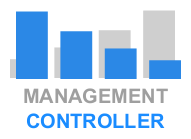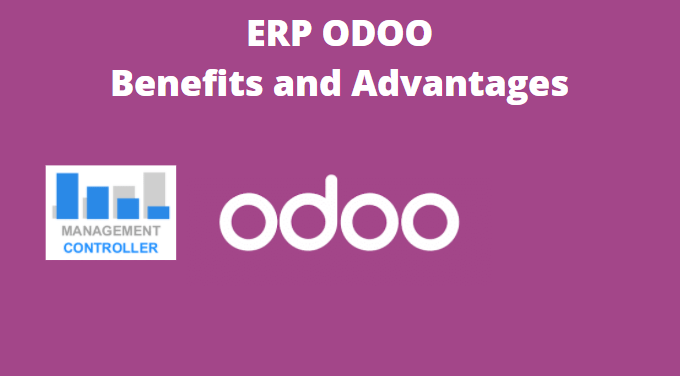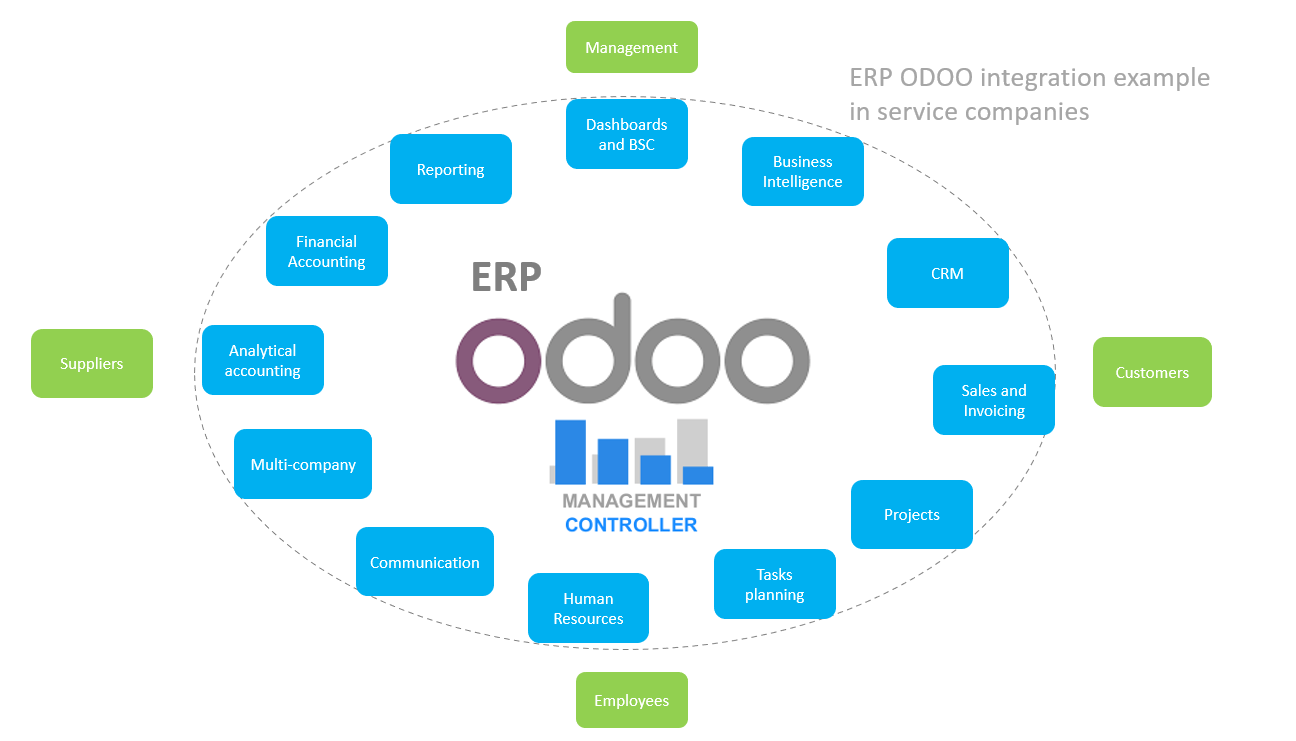ERP ODOO Benefits and Advantages.
If you have come this so far, you may have heard about the ERP ODOO and its ability to carry out an integrated management of the company.
You may have heard that the ERP ODOO is a modular system that adapts to the processes of each company, an Integrated Management System tailored according to the needs of each company, not all companies invoice the same, not all service companies have the same work flow, not all have the same manufacturing or logistics processes and not all have the same reporting, information analysis or decision-making needs.
The ERP ODOO is a free and open source information system, so any consulting company is capable to perform installations, modifications or adaptations. So it is easy to change consulting companies if necessary.
ODOO is a system that does not have licensing costs per use or user, a user with the appropriate capacity can install it for free and configure it to suit, the costs that a consulting company usually offers are those relating to the implementation of the system that commonly includes project analysis, design, installation, configuration and parameterizations, developments if necessary, document formats, advanced reports, data migration, training and launch assistance, system maintenance and server hosting services are also usually contracted in case the company prefers not to install it on its own.
As you have seen, it is not a closed system, on the contrary, one of its great virtues is its ability to grow as the company grows, adding new functions, improving processes or increasing information analysis.
Another technical characteristic is its ability to connect with other systems, there are consulting companies that integrate with online stores or email marketing systems, for example.
The system is accessed from a web browser so it does not require installation on PCs, and its use is similar of a web page, with links, direct accesses … this allows access to any type of information from any site quickly .
If the technical benefits have not caught your attention, surely the economic advantages will. An ERP like ODOO is not an expense, it is an investment from which you have to obtain a return, for example if you currently dedicate 200 hours a week to administration processes, thanks to the ERP it can be reduced to 50 hours a week, with this you will have obtained a 75% reduction in the cost of these processes. Better processes always imply economic savings or an improvement in efficiency, and an improvement in efficiency usually translates into greater volume of business and profitability since more can be achieved with the same or fewer resources.
Economic advantages that ERP ODOO brings to companies
1) Reduction of time to perform information management for the company. Reduction of time in data recording and in information processing for control, analysis and decision-making. Integrated and automated processes. Economic savings and efficiency improvement.
2) Reduction of time and improvement of administrative processes. Elimination of double tasks, rework and reduction of manual registrations. Eliminate what is not important to the activity of the company. Eliminate or reduce what does not add value to the company.
3) Keeping the information up to date, such as in the case of accounting, treasury and controlling, in order to improve financial and strategic decisions. Imagine having the bank accounting information up to date with a simple synchronization of the bank statement to the ERP, but not only that, imagine being able to integrate a Balanced Scorecard with real time values.
4) Manage key indicators in a scorecard in real time and in an automated way to control and analyze in a simplified way the key aspects of the business and the internal functioning of the company.
5) Avoid wasting time in the search and control of information, such as when keeping track of stock or the absence of employees, due to vacations or other causes.
6) Eliminate the use of separate spreadsheets and databases that can lead to errors and loss of information. Excel sheets are very useful for certain functions, but their use for the management of key aspects of the company that need integration with other areas can mean great losses of information processing time, loss of time in maintaining the sheets calculation and high training time for users not used to this type of tool.
7) Centralize the management language so that any user with a minimum of training is able to perform tasks that another user performs. Very low learning curve. Management is no longer exclusive and independent of each user and becomes part of the company as a whole. This allows the company to work as a team. For example, any user can learn accounting in ERP not being a specialist. This implies a reduction in training costs in management issues.
8) Keep track of aspects that were not previously kept, such as the real manufacturing cost or control of the expected and real profitability of a project, as well as the possibility of obtaining profitability reports for projects, customers or sales channels (commercial team, online sales, campaigns …) This improves the precision of analysis and decision-making.
9) Increase the revenues thanks to tools such as CRM and online marketing. Increase in the productivity of the commercial team, improvement in the capture of leads or contacts and the monitoring of commercial actions, as well as the ease of preparing sales budgets. Improvement of business intelligence and decision-making on key aspects in the commercial and marketing area.
10) Increased motivation of company staff, having access to centralized information, as it is a quite simple system to use and to manage and does not require efforts to obtain information that facilitate their day-to-day work.
The staff feel more involved in the management of the company.
11) Improve communication among company staff. Communication errors, excess of emails, unnecessary meetings are avoided, communication on paper is avoided, in the short term, interdepartmental coordination improves.
12) An ERP provides great synergies between company departments. It facilitates the communication of good practices and facilitates the methodology of continuous improvement (traditionally exclusive to large multinationals but more and more small and medium-sized companies are adopting)
13) An ERP facilitates business scalability and allows the integration of new functions, as well as adaptation to changes in work procedures or incorporation of new procedures.
You have already seen that ERP is not only a great machine to carry out the integral management of the company, it is also a system that facilitates the continuous improvement of organizations and therefore is an investment that generates significant profitability directly and indirectly.
Companies need to continuously improve in order to compete in an environment as complex and aggressive as the current one.
More information about ERP ODOO
- ODOO Balanced Scorecard KPIs analysis and control
- ERP ODOO Benefits and Advantages
- Is ERP ODOO a substitute or a complement to Excel spreadsheets? Take a look ODOO 14
- Planning Purchase Orders Excel report with ODOO data
- 7 keys to successfully implement ERP ODOO
- Reports XLS Excel ODOO
- How to forecast Purchase Orders with ODOO
- How to Control Costs and Analyze margins with ODOO
- Control ODOO Commissions with Excel
- Planning activities CRM ODOO
- ODOO Analysis Margins and Costs of Sales
- Advantages ODOO Manufacturing
- What is an ODOO Functional Consultant?
More Videos about Management Accounting

Industrial company financial manager
Dani is helping us to use ODOO more efficiently, we are rapidly leveling up with the ERP. It is also preparing us very useful analysis and control reports and outstanding management tools. Always available by phone or email, willing to help and collaborate in everything that is proposed. Very professional and fast work. A key service for our company.
Controlling Consultant
Controller ODOO ERP

Email: dani@cashtrainers.com



